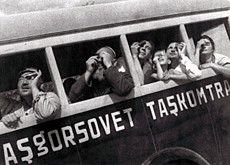
Images of Soviet propaganda come to Winterthur

Soviet use of photographers during the 1920s and 1930s to paint a glowing picture of the revolution is being illustrated at Winterthur's Photography Museum.
But in these often idealised images, the talent of the 14 featured photographers transcends the propaganda behind them.
Some names are familiar to the world of photography, such as the painter and sculptor Alexander Rodchenko, but others were allowed to fade into obscurity until exhibitions such as this one, organised by the Moscow House of Photography in collaboration with the Winterthur museum.
“After the 1930s, the photographs were all very similar,” says Olga Sviblova of the Moscow museum.
At the turn of the century, the Russian photography scene was among the most innovative in Europe.
Various movements evolved, including romanticism, constructivism and the avant-garde, and the exhibition sets out to show what happened in the years which followed.
Instrument of propaganda
After the 1917 revolution, the communist party saw the potential of photography as an instrument of propaganda in a country where 70 per cent of the population were illiterate.
And, as Sviblova writes in the exhibition catalogue, in one of his first decrees after the communists took power, Lenin made sure that photographers worked on behalf of the revolution. She adds that even soldiers in the Soviet army were provided with cameras.
Until the 1920s, the authorities did not concern themselves with the aesthetic aspect of photography but then along came the concept of socialist realism.
Soldiers and workers in the fields began to be pictured smiling optimistically towards the prospect of a dazzling future. “The more reality deviated from this ideal, the more propaganda took over,” says Sviblova.
Sporting events were featured, along with images glorifying construction work.
Matter of survival
“If they wanted to eat, all the photographers had to comply with these new aesthetic criteria in which a uniform image of everyday Soviet life was portrayed, with subjects and style all the same,” she writes.
Some photographers who objected to what was happening to their profession paid the price for their opposition.
One of them, Alexander Grinberg, had to spend four years in a labour camp, and after his release could only work anonymously.
Another, Leonid Shokin, whose work as an early photojournalist earned him fame in the 1920s, saw most of his archive – over 5,000 pictures – destroyed in the presence of an NKVD state security officer.
Post-war changes
Things changed after the Second World War, when growing literacy in the Soviet Union led the authorities to rely more for their propaganda on words rather than pictures.
Meanwhile, archives went on being destroyed up until the 1980s, either through ignorance or because of a lack of storage space.
“The Americans were the first to appreciate the importance of the photographic testimony,” says Sviblova. “They came in the 1980s and bought photographic treasures for virtually nothing.
“They saved much material, but even so about 80 per cent of the total archive has been lost for ever.”
swissinfo, Ariane Gigon Bormann in Winterthur
“Soviet Photography in the 1920s and 30s” is at the Winterthur Photography Museum until May 16.
It presents nearly 250 photographs taken after the 1917 revolution.
The exhibition was organised in collaboration with the Moscow House of Photography.
The Moscow museum’s Olga Sviblova estimates that 80 per cent of the photographic archives have been destroyed.
Interest in Soviet-era photographs is comparatively recent.

In compliance with the JTI standards
More: SWI swissinfo.ch certified by the Journalism Trust Initiative






























You can find an overview of ongoing debates with our journalists here . Please join us!
If you want to start a conversation about a topic raised in this article or want to report factual errors, email us at english@swissinfo.ch.